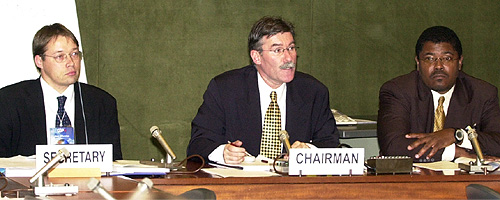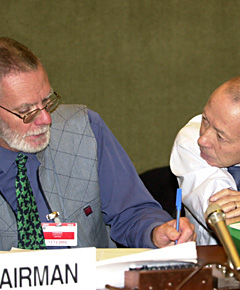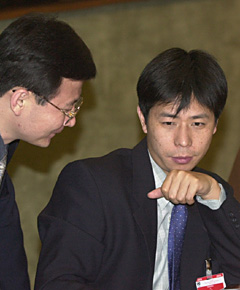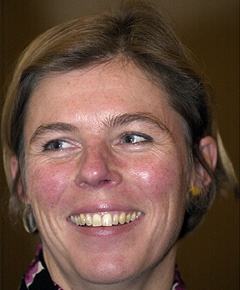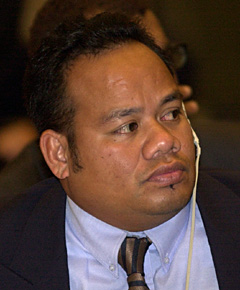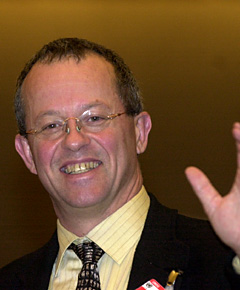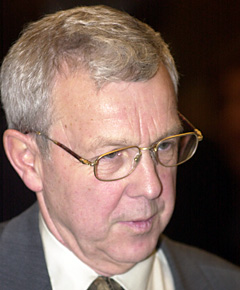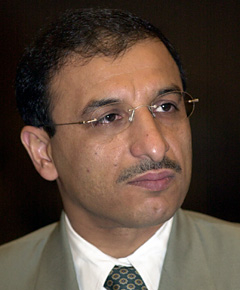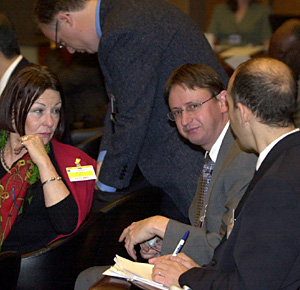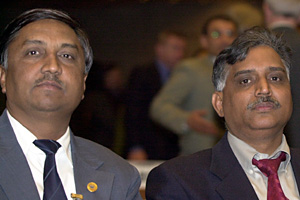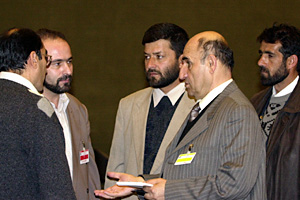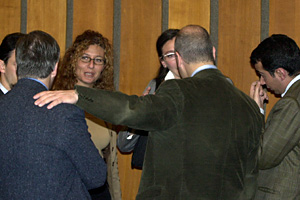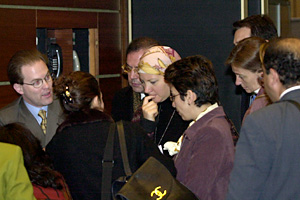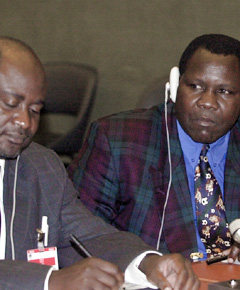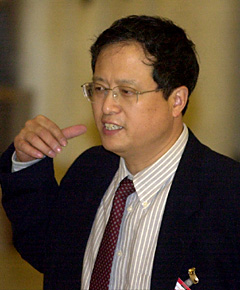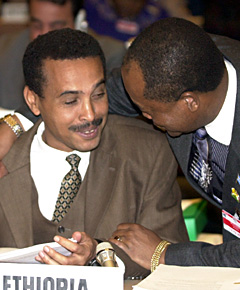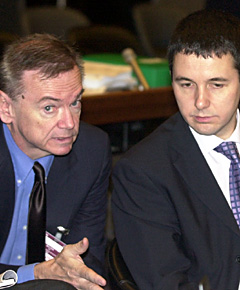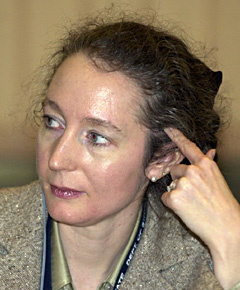|
Wednesday, 11 December 2002
Delegates met throughout the day in Plenary, Working Groups and Contact Groups to consider outstanding items on the agenda of the COP-6 preparatory segment, including implementation issues such as compliance, the Strategic Plan and the Basel Convention Regional Centers (BCRCs), and institutional and financial arrangements. Parties concluded their consideration of most agenda items, although decisions on the Strategic Plan, the budget and institutional arrangements have yet to be finalized.
PLENARY
IMPLEMENTATION OF THE BASEL CONVENTION: Protocol on Liability and Compensation: Executive Secretary Kuwabara-Yamamoto introduced a Secretariat's Note and draft decision on the Protocol on Liability and Compensation, with Annexes containing a questionnaire for Parties on ratification of and accession to the Protocol, and a work plan for the facilitation of the Protocol's ratification, accession and implementation. The EU proposed several amendments, while AUSTRALIA expressed concerns at introducing changes at this late stage. The EU withdrew its proposals and the decision was adopted without amendment.
Bilateral, multilateral or regional agreements or arrangements: On the draft guidance elements for the preparation of bilateral, multilateral or regional agreements or arrangements, delegates concluded that the issue could not be resolved at COP-6, and agreed to ask the Subsidiary Bodies to further consider the issue and report to COP-7. Delegates agreed to a proposal by Japan that Parties will be requested to submit comments to the Secretariat, for presentation at the first session of the Subsidiary Bodies.
Cooperation and partnerships: Executive Secretary Kuwabara-Yamamoto introduced a draft decision on international cooperation and amendments proposed by the Strategic Plan and BCRC Working Group. The EU drew attention to its proposed amendment, which welcomes the work of the International Maritime Organization (IMO) and the International Labour Organization (ILO) in connection with the environmentally sound management of ship dismantling, and requests the Basel Secretariat to create a joint working group with the ILO and IMO. MEXICO and BRAZIL expressed concerns about the EU proposal, including potential budgetary implications. Following informal dialogue, delegates approved the decision and the EU amendment, but with additional amendments to already approved draft decisions on legal aspects of ship dismantling and on technical guidelines for the environmentally sound management of ship dismantling. The amendments recognize the ILO's specialization in formulating a stepwise approach to safe ship breaking from a labor perspective.
Executive Secretary Kuwabara-Yamamoto also introduced a decision on cooperation with the World Trade Organization (WTO). CANADA introduced an alternative draft decision. He explained that the decision requests the Basel Secretariat to, inter alia: seek observer status in the WTO Committee on Trade and Environment special session meetings; report to the Parties on any WTO meetings it attends; and provide general information to the WTO on trade provisions of the Basel Convention. Delegates approved Canada's draft decision.
Executive Secretary Kuwabara-Yamamoto also introduced draft decisions on partnerships with environmental NGOs, industry and business and on elements for a framework for cooperation with industry. The EU, supported by CANADA, proposed merging the two decisions, and delegates agreed to postpone discussion on this issue, pending the development of new text. The EU subsequently introduced draft text in Plenary merging the decisions, and President Jelev said it would be discussed further on Thursday.
Capacity building activities: Executive Secretary Kuwabara-Yamamoto introduced a progress report on activities of the BCRCs and a report and draft decision on capacity-building activities within the Convention. ARGENTINA, supported by BOLIVIA and PERU, suggested inserting a reference to the Information Exchange Network on Capacity Building for the Sound Management of Chemicals (INFOCAP), and the decision was adopted, as amended.
BCRCs: Several Parties, including NEW ZEALAND, IRAN, the RUSSIAN FEDERATION and EL SALVADOR, presented proposals and reports on BCRCs. INDIA said it may submit a draft decision for a BCRC for South Asia, while PAKISTAN expressed reservations about basing a center in India. The Plenary adopted decisions on BCRCs in Senegal and Iran. Parties also adopted a decision on a Pacific Regional Center for the Basel and Waigani Conventions and on a Center for Arab States based in Cairo.
The Plenary adopted without amendment a draft decision proposed by the African Group linking the work of the Basel Convention and its BCRCs with the New Partnership for Africa's Development (NEPAD).
Compliance: President Jelev reported that the Compliance Working Group and informal sub-group negotiations had been successfully concluded and indicated that a revised text would be considered in Plenary on Thursday.
AMENDMENT OF THE BASEL CONVENTION AND ITS ANNEXES: Implementation of Decision III/1 (amendment of the Convention): Delegates discussed a report on the implementation of Decision III/1 and amendments proposed by the EU . AUSTRALIA supported the original report without the EU's amendments and CANADA expressed concerns about the EU's proposed time limit for ratifying the ban amendment. ETHIOPIA supported the EU's text. Following further consultations, the EU revised its proposals, and the decision was adopted, as amended.
Analysis of issues related to Convention Annex VII: SWITZERLAND reported that a small drafting group had met on this issue and had agreed on text that would be submitted to the Annex VII Working Group for its consideration on Thursday morning.
Proposed amendments to Convention Annexes VIII and IX: Executive Secretary Kuwabara-Yamamoto introduced a document describing Parties' submissions on adjusting the lists of wastes contained in Annex VIII or IX and containing a draft decision on this matter. She noted that the Technical Working Group had approved seven proposals to amend Annexes VIII and IX contained in the draft decision, and drew attention to amendments proposed by the EU. The RUSSIAN FEDERATION questioned some of the proposals to amend Annex IX, including those on end-of-life motor vehicles and on waste textile floor coverings and carpets. Following informal consultations, the Plenary adopted the decision, including the EU's proposals, which had been altered to reflect the RUSSIAN FEDERATION's concerns.
Issues related to Annex IX: President Jelev introduced a document containing information and a questionnaire designed to assist Parties in the use of Annex IX, noting that the Technical Working Group had been working on this issue. Parties agreed to a proposal by CHILE to insert a note in the text clarifying that this is a voluntary questionnaire, and the document was adopted, as amended.
OTHER MATTERS: The Plenary approved a logo for the Basel Convention.
WORKING GROUPS
BUDGET AND INSTITUTIONAL ARRANGEMENTS: The Working Group attempted to finalize the draft decision on financial matters, the terms of reference for the administration of the trust funds, and the budget. Some issues in the draft decision remained unresolved by late evening, including the Secretariat's use of anticipated savings from the Basel Convention Trust Fund and specific budgetary amounts. Regarding the terms of reference, delegates were unable to agree on the contribution levels to this Trust Fund and the possible role of the Expanded Bureau in approving unbudgeted expenditures. Many Parties expressed concerns regarding the Convention's current budget surplus and the Secretariat's reliance on the surplus to "balance" the budget. The US, supported by several other developed countries, suggested the surplus should be paid back to donors. CANADA argued it should be spent on certain priority issues in the Strategic Plan, while MEXICO and FRANCE argued that it should be used for interpretation, translation, and developing country participation expenses. In reviewing the budget, several delegates expressed concerns about the cost consequences of reclassification of posts within the Secretariat and specific increased costs since COP-5.
STRATEGIC PLAN AND REGIONAL CENTERS: This Working Group completed its work on the draft decisions relating to the legal establishment of BCRCs and BCRC business plans. It also addressed but was unable to complete discussions on the draft Strategic Plan and a related draft decision.
On BCRC funding-related matters, delegates approved a package solution submitted by a drafting group, with minor amendments. On the Secretariat's mandate to negotiate and sign the Framework Agreement, delegates adopted compromise language. On the Secretariat's assistance in finalizing BCRC's business plans, delegates agreed to replace "member states" with "countries" in order to cover non-member countries to be served by the Center. On authorizing the Secretariat to negotiate financial arrangements with the BCRCs, GERMANY opposed a reference to the Basel Convention Trust Fund, noting that this Fund cannot be directly used for BCRCs. Delegates agreed to using consistent language, referring to "contributions from the Basel Convention Trust Fund, as agreed periodically by the COP."
On the draft Strategic Plan, GERMANY, CANADA and BRAZIL suggested, while EGYPT and the EU opposed, considering and adopting the text of the Plan separately from the Action Table.
COMPLIANCE WORKING GROUP: Following extensive negotiations, the Compliance Working Group, chaired by Alistair McGlone (UK), agreed to a compromise text on the compliance mechanism that was drafted by an informal sub-group, thus completing its work. The draft decision will be taken up in Plenary on Thursday or Friday.
|
|

